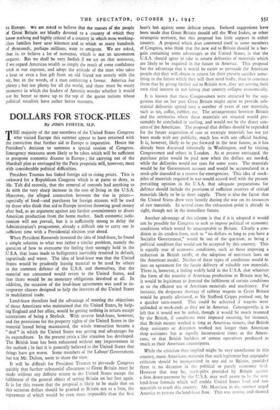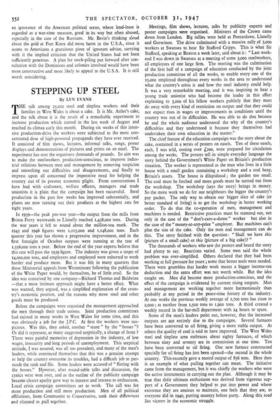DOLLARS FOR STOCK-PILES
By JOHN FOSTER, M.P.
Fr HE majority of the zoo members of the United States Congress who visited Europe this summer appear to have returned with the conviction that further aid to Europe is imperative. Hence the President's decision to summon a special session of Congress. Emergency measures seem likely to be taken which will be sufficient to postpone economic disaster in Europe ; the carrying out of the Marshall plan as envisaged by the Paris proposals will, however, meet With considerable political difficulties.
President Truman has linked foreign aid to rising prices. This is awkward for a Republican Congress which is at pains to deny, as Mr. Taft did recently, that the removal of controls had anything to do with the very sharp increase in the cost of living in the U.S.A. Moreover, the alleged connection between the rise in prices— especially of food—and purchases for foreign account will be used by those who think that aid to Europe involves throwing good money after bad, as an argument against any further commitments to divert American production from the home market. Such economic isola- tionism will not prevail, but it is sufficiently strong to delay the Administration's programme, already a difficult one to carry out in sufficient time with a Presidential election year ahead.
When President Roosevelt invented the idea of lend-lease, he found a simple solution to what was rather a similar problem, namely the question of how to overcome the feeling then strongly held in the U.S.A. that loans made to belligerents inevitably resulted in default,. ingratitude and waste. The idea of lend-lease was that the United States would be prudently leasing material to be used by others in the common defence of the U.S.A. and themselves, that the material not consumed would revert to the United States, and that there would be no monetary obligations involved at all. In addition, the occasion of the lend-lease agreements was used to in- corporate clauses designed to help the interests of the United States in multilateral trade.
Lend-lease therefore had the advantage of meeting the objections of those Americans who maintained that the United States, by help- ing England and her allies, would be getting nothing in return except accusations of being a Shylock. With reverse lend-lease, however, and the provisions for the property rights of the United States in the material leased being maintained, the whole transaction became a "deal" in which the United States was getting real advantages for its expenditure. In the present crisis a like situation has developed. The British loan has been exhausted without any improvement in the outlook ; in fact it is generally believed in the United States that things have got worse. Some members of the Labour Government, but not Mr. Dalton, seem to share the view.
It will be difficult for President Truman to persuade Congress quickly that further substantial allocations to Great Britain must be made without any definite return to the United States except the fulfilment of the general object of setting Britain on her feet again. It is for this reason that the proposal is likely to be made that on this occasion dollars should be granted to Britain not as a loan, the repayment of which would be even more impossible than the first
loan's but against some definite return. Isolated suggestions hava. been made that Great Britain should sell the West Indies, or other strategetic territory, but this proposal has little support in either country. A proposal which does commend itself to some members of Congress, who think that the new aid to Britain should be a bar- gain containing some advantages to the United States, is that the U.S.A. should agree to take in return deliveries of materials which are likely to be required in the future in America. This proposal has the advantage that it would be easier to persuade the American people that they will obtain in return for their present sacrifice some- thing in the future which they will then need badly, than to convince them that by giving further aid to Britain now, they are serving their own vital interest in not letting that country collapse economically.
It is known that these Congressmen were attracted by the sug- gestion that on her part Great Britain might agree to provide sub- stantial deliveries spread over a number of years of raw materials, such as tin, coffee, rubber, etc. The arrangements between Britain and the territories where these materials are situated would pre- sumably be concluded in sterling, and would not be the direct con- cern of the Americans. The proposal that dollars should be expended for the future acquisition of rare or strategic materials has not yet been made with any publicity, much less with any official backing. It is, however, likely to be put forward in the near future, as it has already been discussed informally in Washington, and by visiting Congressmen and others in London. As at present envisaged, the purchase price would be paid now when the dollars are needed, while the deliveries would not start for some years. The materials would be for Government account and would be accumulated in a stock-pile intended as a reserve for emergencies. This idea of stock- piles of materials required in war would accord well with the present prevailing opinion in the U.S.A. that adequate preparations for defence should include the provision of sufficient reserves of critical materials likely to be in short supply. There is also the factor that the United States drew very heavily during the war on its resources of raw materials. In several cases the exhaustion point is already in sight, though not in the immediate future.
Another advantage of this scheme is that if it is adopted it would not be possible for Congress to seek to impose political or economic conditions which would be unacceptable to Britain. Clearly a con- dition in its crudest form, such as "no dollars as long as you have a Socialist Government," would be out of the question, as being a political condition that would not be accepted by this country. This is equally true of economic conditions, such as those imposing a reduction in British tariffs, or the adoption of anti-trust laws on the American model. Neither of these types of conditions would fit into an agreement for the future delivery of valuable raw materials. There is, however, a feeling widely held in the U.S.A. that whatever the form of the transfer of American production to Britain may be, it would be legitimate to demand the fulfilment of certain conditions as to the efficient use of American materials and machinery. For instance, the desperate shortage of railway wagons in Great Britain would be greatly alleviated, as Sir Stafford Cripps pointed out, by a quicker turn-round. This could be achieved if wagons were unloaded at week-ends as they are in America. Consequently, it is felt that it would not be unfair, though it would be much resented by the British, if conditions were imposed ensuring, for instance, that British miners worked as long as American miners, that British shop assistants or dairymen worked not longer than American shop assistants but at equally inconvenient times as the Ameri- cans, or that British builders or cotton operatives produced as much as their American counterparts.
While the criticism thus implied might be very unwelcome in this country, many Americans maintain that such legitimate but unpopular criticism should be incorporated in any aid to Britain, provided there is no dictation in the political or purely economic field. However that may be, stock-piles provided by Britain against a firm down-payment by the U.S.A. may well prove to be the new lend-lease formula which will enable United States food and raw materials to reach this country. Mr. Morrison in the summer urged America to restore the lend-lease flow. This was unwise, and showed an ignorance of the American political scene, where lend-lease is regarded as a war-time measure, good in its way but often abused, especially in the case of the Russians. Mr. Bevin's thinking aloud about the gold at Fart Knox did more harm in the U.S.A., since it seems to Americans a gratuitous piece of ignorant advice, carrying with it the implied criticism that the United States had not been sufficiently generous. A plan for stock-piling put forward after con- sultation with the Dominions and colonies involved would have been more constructive and more likely to appeal to the U.S.A. It is still worth considering.



































 Previous page
Previous page